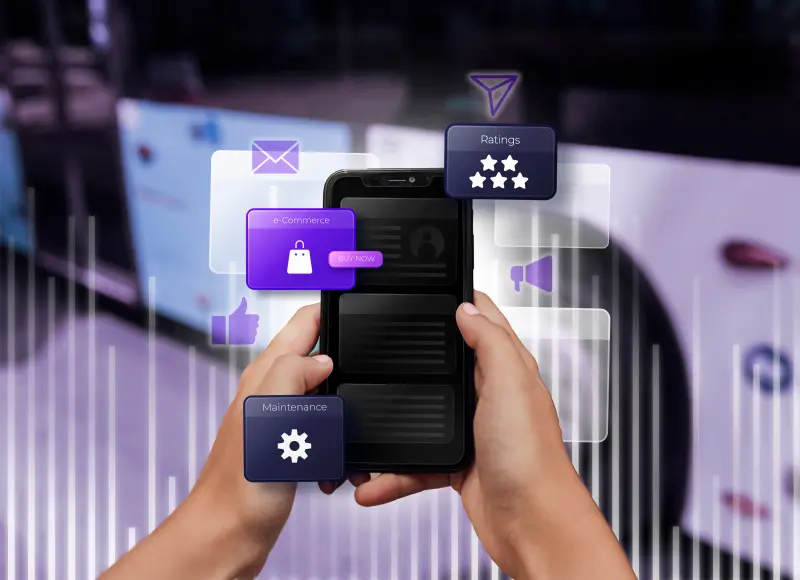Table of Contents
Explore the significance of chatbots in improving customer engagement on our site. Uncover how they contribute to better customer experiences.

During the digital era, businesses constantly strive to find fresh ways of linking with and pleasing their customers. A technology that has altered how companies interact with their clients is known as chatbot. Chatbots, using artificial intelligence (AI), have become an extremely crucial feature for assisting customers and carrying out conversations with people on websites and social media platforms. This article discusses how to use chatbots and all their benefits.
Choosing the Right Platform
The initial move, starting with chatbots, is selecting the correct platform. Companies can position chatbots on their websites or utilize them on social media platforms like Facebook Messenger, WhatsApp, and Instagram Direct Messages. The platform's decision is based on where most individuals who appreciate our brand spend their time.
Defining Objectives
Setting Clear Objectives
Before using a chatbot, you must define goals. It would help if you decided what tasks or purposes you want the chatbot for - perhaps answering regular questions, assisting people in locating products, or delivering customer support. Having clear goals helps in making a better chatbot.

Enhancing SEO
Chatbots are beneficial in improving a website's search engine optimization (SEO). What is SEO? SEO is all about giving quick answers to questions from visitors and keeping their interest. This makes individuals stay on the site longer, not exiting fast. In this way, chatbots decrease bounce rates and improve visit duration. You can instruct your chatbot to include keywords in its responses, boosting its SEO rank. Effective functioning chatbots create new content through conversations with users, enhancing SEO work even further.
Availability
An essential benefit of chatbots is that they can work non-stop. Unlike human workers, chatbots do not require sleep and are continually available for customer assistance during day and night shifts. Therefore, when a customer poses a query, the chatbot responds promptly to provide answers. This being available makes customers happy and makes sure problems are fixed fast.
Instant Responses
In the rapidly shifting digital realm, people demand speedy responses. Chatbots can instantly reply to frequently asked questions, minimizing waiting time substantially. This swiftness assists in maintaining customer satisfaction and prevents annoyance that arises from slow replies.
Cost-Effective Solution
The cost-effectiveness of chatbots, as they can handle many questions at once, might be cheaper than hiring more customer service workers. Running chatbots could decrease the requirement for a big team to support numerous queries concurrently. This economic advantage allows businesses to allocate their resources towards other crucial sections. Furthermore, creating chatbots is a one-time setup that requires initial investment. However, it has fewer continuous expenses when compared to paying for employee wages, benefits, and ongoing training.
When chatbots take care of the easy questions and basic help tasks, human agents can focus on more complex and valuable interactions. This makes service better without needing any extra cost for it to happen. Moreover, chatbots have a high ability to grow in size or scope. This shows they can handle busy periods and a high load of queries without hiring more people, leading to superior operational cost management.
Personalization and Enhanced User Experience
Intelligent chatbots can observe and understand user actions, along with preferences. They can then give unique responses to each person's tastes and characteristics. This makes the interaction more pleasant for everyone involved. Customization is essential because it gives people a feeling of being valued and recognized, improving brand loyalty.
For example, a chatbot could greet customers returning by name, recall previous talks and propose custom product recommendations based on the customer's prior search history. This personalization makes the experience more engaging and enjoyable for users, potentially leading to better customer satisfaction. Moreover, personal interactions can result in improved conversion rates because people receive information and deals related to them - this increases the likelihood of completing a purchase.
Handling Routine Tasks
Chatbots work well for regular and repetitive tasks, such as answering common questions, scheduling appointments and managing orders. Automating these jobs with chatbots frees workers to engage in more complex or crucial conversations. This improves the overall service experience for all parties involved. For example, a chatbot can handle simple but time-consuming tasks like resetting passwords or giving details about shipping and return processes.
Doing these activities automatically helps businesses give consistent and precise responses while letting human agents deal with more complicated matters that need empathy and critical thoughtfulness. This boosts operational effectiveness and enhances overall client experiences by lessening waiting periods and assuring quick solving of regular problems.
Data Collection and Insights
Chatbots help gather information about customers' interactions, likes and dislikes, and typical problems encountered. This data assists companies in comprehending customer behaviours and patterns in a more precise manner. When these understandings are used, businesses make intelligent decisions about improving what is offered. For instance, to help in this area, chatbots could record how often and what kind of queries people make.
They might find patterns in customer interactions or where they usually face problems. This data can enhance website navigation, update product descriptions, or adjust marketing tactics accordingly. Also, collecting data instantly assists companies in rapidly adapting to alterations in customer requirements and market situations to stay competitive and reactive.
Additionally, the knowledge obtained from chatbot interactions can guide product creation and advancement. This way, products are designed to fulfil customer requirements more effectively.
Scalability
As businesses get larger, they also require more customer support. Chatbots offer flexible solutions to multiple questions without slowing down replies or diminishing quality. This adaptability helps businesses maintain good customer service quality even when they expand.
In contrast to human agents requiring proportional staffing and training increases, Chatbots can be scaled up quickly to meet rising demand. Chatbots can keep their performance and response times consistent, whether there is a sudden increase in customer inquiries when launching a product or managing more traffic during the holiday season.
One crucial aspect of maintaining a successful B2C model is providing exceptional customer service. Poor customer service can have significant consequences on customer retention and overall business success. To understand the impact of poor customer service on your business, you can read more about the consequences of poor customer service.
This means businesses can supply efficient support without putting at risk customer satisfaction due to overload. Also, it's simple to update and improve chatbots with fresh characteristics and abilities. This lets them expand with the business and adjust to changes in customer requirements or technology progressions.
Multilingual Support
In a world where businesses are becoming more global, offering support in different languages is important. Chatbots can be coded to communicate using multiple languages, enabling companies to assist a broader range of customers. This advancement enhances clients' happiness and helps businesses extend their influence into worldwide marketplaces.
Integrating with Other Systems
Today, chatbots can be combined with other business systems, such as customer relationship management (CRM) software, e-commerce platforms, and email marketing tools. Doing this ensures a smooth transfer of data for better functioning. For example, after a chat session finishes, the chatbot might automatically update customer information in the CRM.

Boosting Sales and Conversions
Chatbots lead customers to purchase and help in better conversion of sales. They give suggestions about products or services similar to what the customer is looking for. This way, chatbots encourage buyers who might need more time to decide. By answering queries and offering assistance on chat windows, these bots can reduce the rate at which carts are abandoned. Moreover, they engage with potential shoppers by sharing targeted advertisements and custom-made offers, which push them towards making purchases.
For example, if a person goes to an e-commerce site, a chatbot could welcome them and help find products that suit their interests or past purchases. This custom interaction can greatly improve the shopping experience and make it more likely that customers will finish buying something. Suppose someone is hesitating at the moment of checkout. In that case, a chatbot might step in by proposing a discount code or responding to any final queries - this action could reduce instances where carts are abandoned.
Customer Feedback Collection
Chatbots could be utilized to gather customer feedback instantly. Once a conversation is finished, the chatbot can inquire from the client about their experience by asking them to rate it or give comments. This real-time feedback collection assists businesses in recognizing where they need to improve and handling issues quickly, resulting in enhanced customer contentment.
Supporting Marketing Campaigns
Chatbots can be used for marketing campaigns to involve customers in interactive activities. They might send personalized messages, provide news about fresh products or services, and even organize quizzes or surveys. Including chatbots in marketing strategies may assist businesses in creating more lively and captivating campaigns that connect with their intended audience.
Conclusion
Chatbots are becoming a perfect friend for improved customer talk and service. When businesses put chatbots on websites and social media, they can give help any time, day or night, respond without delay, and even have personal chats with customers. The cost-saving aspect of chatbots, along with their capability to manage daily jobs and provide necessary info, makes them highly beneficial for any current business. With the enhancement of AI, chatbots will become more intelligent. This is going to change how businesses interact with customers and provide services in a manner that has never been seen before.






